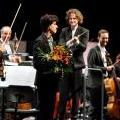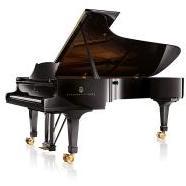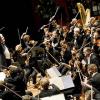Search the Community
Showing results for tags 'form'.
-
In this piece, I've taken the ideas I had behind the formal structure of my earlier upload, Episode #1, and I've changed it up a bit (largely listening to the critiques that work garnered). I've never been good describing my ideas in detail -long standing trait. Much like Episode #1, this work takes the basic Rondo structure and expands upon it. When I originally thought of the idea for an episodic (rondo-like) formal structure, my original goal was to intersperse the A sections with heavily contrapuntal material (B, C, and D sections all being fugal in nature). While I still may do a work like this in the future, I think that -for now- I'm trying to find a way to make this type of structure work for the language that I use in my works. The score is a lot nicer (thank you MUSESCORE!)
-
Hello! Sometimes I just need to write and write and write... without thinking about whether people will like it or not. I decided to compose a piece based on motifs. This time, I decided to compose another neoclassical composition: String Quartet No.2 ''Cuckoo'' in G, Op. 65. The music is meant as a sort of scherzo. The main motif is the sound of a cuckoo. This string quartet consists of only one movement, which is in sonata form. Feel free to comment! Maarten
-
If you've ever written a long piece of music (say 10+ minutes), or got bored trying, what inspired you to do so, and how did the creative process feel different from that of writing a short and sweet piece (say < 5 minutes)? A lot of western art music is very long compared to popular music. Are there certain things that a long piece, in your opinion, can do better than a short one? I'm asking because I have long wanted to make a long music, simply to try it and see how it changes my perspective. I've read that Sonata form (exposition > development > recapitulation) is a good solution to writing a long piece. Can you propose a thoroughly analytical explanation of why Sonata form may be such a popular choice, and are there any other large scale forms which might be equally applicable? Thanks
-
Hello everybody! It tooks ages to get some inspiration and it feels very satisfying to finally post some new music... This composition is going to be submitted to a Dutch concours with the theme ''Lang zullen we ronddraaien.'' This can be translated like: The earth will rotate for still much time. I interpreted the music like we become crazy, which means ''We draaien door.'' The poem is written by me and its theme is the refugees crisis. The form is Mosaic Form. Please tell me your opinion about the music! Feedback is appreciated as well. Maarten We draaien door Kijk om je heen. Voor je, achter je, links van je, rechts van je. Die man, die vrouw Die jij hier ziet zijn bevoorrecht. Dat kind Dat jij opmerkt, heeft geluk Denk na. We beklagen ongeremd Het weer, het eten, het drinken, gisteren, vandaag, morgen; Anderen. Die man, die vrouw, dat kind, Zij en wij leven in een bijna-utopie Die we liever niet met anderen delen. Denk na! Andere mannen, vrouwen, kinderen Die juist nú hulp nodig hebben, Keren wij de rug toe. Ons geluk delen met medemensen Die de hel meemaakten; Lijkt een stap te ver Voor sommigen van ons. We draaien door! Het duizelt me. - Maarten Bauer, 12 september 2017. TRANSLATION We become crazy Look around you In front of you, behind you, left from you, right from you. That man, that woman Who you see there are privileged. That child Who you notice, is lucky. Think. We complaint unbulliently of The weather, the food, the drinks, yesterday, today, tomorrow; Others. That man, that woman, that child They and we live in an 'almost utopia' Which we preferably do bot share with others. Think! We turn our backs upon Other men, women, children Who need help right now. Sharing our fortune with neighbours, Who experiened the Hell, Seems to go too far For some of us. We become crazy! I get dizzy from it. - Maarten Bauer, 12 september 2017.
-
Does a Pavan have a form?
-
Hello, I am studying composition at a university and one of my optative subjects is "Musical Sociology". For that subject I am writing a short paper about the accessibility of contemporary music. More specifically, I am studying the hypothesis that two elements, form and musical discourse, are more important than the musical language used in a given work in determining it's accessibility. For anyone interested in helping I have, at the moment, two questions. The first is: among contemporary works written using non tonal idioms, which would you consider to be more accessible, and why? I also ask the opposite question regarding works written in a more traditional tonal idiom. Which of those « works would you consider to be less accessible, and why? Thanks for the help, and sorry for any mistakes.
- 25 replies
-
- sociology
- contemporary
-
(and 6 more)
Tagged with:
-
Hello everyone! I've found recently that my main problem when composing a piece is that I write small portions of it at a time, and end up having a hard time connecting the dots. For example, I might come up with an 8-bar melody as the main "theme," a development of that theme, and an ending, yet nothing in between to connect them. My question to you then is this: Have any of you experienced similar problems? How did you overcome this sort of "writer's block?"
-
Form-wise, do you set out to compose your pieces in a specific, predetermined form, and to "manipulate" or channel your inspiration to conform to the demands of that form; or do you allow the piece itself and the directions your inspiration guides you towards to freely dictate the original form your composition will take? I don't have much practical knowledge about the various forms and I am wondering whether I should try to learn them and try to incorporate them into my compositions, whether I should consciously try to compose according to specific forms.
-
what should I need to know about waltzes before I start writing one? Is there a specific form to it? anything about the key or something that specific?
-
Hello everyone, I need some help and/or recommended resources/links when it comes to the topics mentioned above, thank you for your time! =)
-
This is a thought that has nagged at me for years now, ever since I started to compose. Let me make it clear, I am not referring to what forms are available on a larger scale (e.g. Concerto, Sting Quartet and so on), nor do I mean how do we handle and develop our themes and ideas – all be this closer to what I mean. I am referring specifically to our use of form and its originality. For example if I say ‘Sonata form’ or ‘Scherzo’, immediately one conjures up a preconception of an inner form – a ‘middle-ground’ form perhaps, if we were to borrow a term from Schenker. Taking a sonata for example, the inner form using the most basic model would be: Exposition (AB-codetta), Development (A’B’), and Recapitulation (AB-coda). However, such middle-ground structures and their subsequent tonal implications seem unsatisfactory in contemporary composition. So, how on this level should we structure music? Obviously some forms are tied to their preconceptions more so than others, the Scherzo for example is little more than a name nowadays rather than form set in stone. On the other hand the sonata despite its many permutations is still a sonata; it is still tied to the concepts of exposition, development, and recapitulation no matter how blurred the boundaries are. Staying strictly within the realms of ‘absolute music’, – i.e. music with no extra-musical connotations such as the tone poem, or other music in which a narrative governs its structure – if the sonata as a form is redundant in 21st century what do we replace it with? As soon as we say this, a whole world of possible alternatives to the sonata opens up. Unfortunately many, (though for different reasons) seem equally unsatisfactory as the sonata. For example, opening a concerto with a (strict) fugue would probably be unsustainable. Using an essentially made up form e.g. ABABACDEBA, lacks the academic rigour required in contemporary composition – at least in this ‘middle-ground’. We could develop forms based upon mathematical principals such as the Golden Ratio, but this is more of an overall form (like the scherzo) and so would leave questions regarding thematic coherence relative to the structure. In short I am at a loss, any suggestions? J








